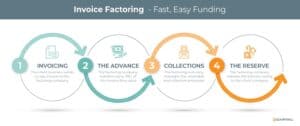The history of factoring is older than you think
The history of factoring is quite old, dating back to the ancient Mesopotamian times and the code of Hammurabi. It is a financial practice that many companies use to gain access to cash flow across industries and around the world. Throughout the history of factoring, few industries have embraced the benefits of invoice factoring as well as the transportation industry.
Trucking has been a commercial venture in North America for over a century, and invoice factoring has supported the industry since its early days. As OTR carrier services grew in scale and importance, freight factoring, a specialized form of factoring for trucking companies, evolved to become a significant part of the history of factoring. Today, freight factoring is a mainstream financial option for trucking businesses in need of operating capital.
Trucking is a significant part of the history of factoring
The trucking industry has become a prominent user and a significant part of the history of factoring. Trucking was introduced to North America in the late 1800s and gained prominence as technology and road systems improved. After World War II, expanded highway networks in the U.S. and Canada solidified trucking’s role in the supply chain. This growth led financial firms to adopt and tailor factoring arrangements to align with the needs of growing trucking companies. This specialization sparked a new age in the history of factoring. A boom in funding transportation companies had begun as freight factoring debuted.
As the decades unfolded, the trucking industry experienced a roller coaster ride of wild swings in year-over-year trends. This decade has been very difficult to date. Trucking companies flourished during the spot market boom that followed the pandemic, but two years of freight recession have weakened financial structures and placed many trucking companies in financial distress. It is a notable chapter in the history of factoring, as many fleets depended heavily on freight factoring to boost cash flow, ensure access to working capital, and help secure their sustainability.
Now, the industry is hopeful that the economy will turn for the better, ushering in a new cycle and produce years of steady, moderate growth. Through all this volatility, freight factoring continues to dominate the modern history of factoring as a leading financial strategy for transportation businesses.
Invoice factoring is an ideal funding option for trucking
With far fewer credit limitations, invoice factoring provides a distinct advantage over the restrictive covenants of a banking line of credit. Easier qualification, fast funding and value-added support services produced the ideal funding solution for new and growing transportation companies. These features continue to propel freight factoring as one of the most successful derivatives of the ancient practice in the history of factoring.
One of the greatest advantages and most attractive features of contemporary invoice factoring is the continuous level of cash flow it generates. Because new invoices trigger increased funding, the factoring system provides easy access to working capital that automatically adjusts to the company’s unique business growth rate. Invoice factoring is a form of accounts receivable financing, the only financial mechanism directly linked to a company’s sales. The more invoices a company generates, the more access it has to immediate cash.
A steady and reliable cash flow solution
Due to the daily capital investment needed to keep equipment moving, trucking companies require a steady and reliable cash flow solution. Banks are naturally inclined not to lend to small businesses, especially if it’s in the transportation space. The industry is plagued by numerous challenges, including slim margins and market volatility, banks are reluctant to qualify transportation companies for sufficient credit. For this reason, invoice factoring remains a primary funding source for the trucking industry. It will further advance funding innovations for the industry as the history of factoring continues to unfold.
The future of invoice factoring
The history of factoring has evolved over the centuries yet remains relatively similar to its original form. The success of this financial arrangement is based on expediting payment due on services already delivered. Factoring isn’t a loan, instead, it is the selling of your invoice receivables at a discount in exchange for immediate cash. This simple financing arrangement holds numerous benefits that favor the business owner. These benefits include the following:
- Immediate payment on account receivables due.
- Professional accounts receivable management is included with the service.
- No financial ceiling; the more invoices you generate, the more funds you receive.
The history of factoring is centuries old and will continue to provide financial support to the trucking industry for many more years to come. As trucking is now a significant niche market within the factoring space, industry-specific factoring companies have emerged, providing specialized services to trucking companies of all sizes. These industry specialists offer the most competitive rates, cash advances on loads in transit, equipment financing and discount fuel programs. As long as commercial trucks are on the road to deliver freight and generate invoices, these specialized factoring companies will continue to propagate the history of factoring.
Non-Recourse Factoring
Another significant advancement in the history of factoring is the development of non-recourse factoring. What is non-recourse factoring? Unlike traditional factoring, in non-recourse factoring, the factor assumes the risk of non-payment by the original debtor. If the debtor doesn’t pay the invoice, the business is not required to repay the factor. This method allows businesses to obtain immediate liquidity without the liability of potential non-payment by their customers. Not all companies that offer non-recourse factoring cover the same liabilities. You can find some things to look out for in our blog Top 8 Things to Understand Before Signing A Non-Recourse Factoring Agreement.
Conclusion
The history of factoring dates back to ancient Mesopotamia and has significantly influenced the trucking industry, which has utilized invoice factoring since its early days in North America. As trucking grew, specialized freight factoring arrangements emerged, becoming crucial for cash flow management amid industry volatility. Despite challenges like slim margins and market fluctuations, freight factoring offers trucking companies immediate access to working capital without the restrictive credit limits of traditional loans. Non-recourse factoring has further evolved the practice, allowing businesses to mitigate the risk of non-payment. Today, factoring remains a vital financial strategy for transportation companies, providing steady cash flow and tailored support services.
Contact us today to request a free financing consultation and see what we can do for your trucking business.
Key Takeaways
- Invoice factoring dates back to ancient Mesopotamian times and yet is more prevalent today than at any other time in the history of factoring.
- Freight factoring, a specialized form of factoring for trucking companies, has become a significant part of the history of factoring.
- With far less credit limitations, invoice factoring provides a distinct advantage over the restrictive covenants of a banking line of credit.
- As long as commercial trucks are on the road to deliver freight and generate invoices, specialized factoring companies will continue supporting the transportation industry.
ABOUT eCapital
At eCapital, we accelerate business growth by delivering fast, flexible access to capital through cutting-edge technology and deep industry insight.
Across North America and the U.K., we’ve redefined how small and medium-sized businesses access funding—eliminating friction, speeding approvals, and empowering clients with access to the capital they need to move forward. With the capacity to fund facilities from $5 million to $250 million, we support a wide range of business needs at every stage.
With a powerful blend of innovation, scalability, and personalized service, we’re not just a funding provider, we’re a strategic partner built for what’s next.





